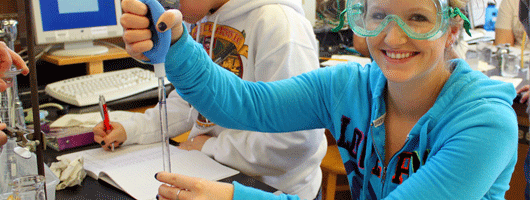 Bachelor of Science in Chemistry
Bachelor of Science in Chemistry
Degree Map >>
About the Bachelor of Science in Chemistry
The Bachelor of Science (B.S.) in Chemistry degree is certified by the American Chemical Society. This ensures the depth and breadth of chemistry background that prepares students for graduate studies in materials science, polymer chemistry, environmental chemistry, analytical chemistry, physical chemistry, drug design, natural products, alternative energies, and a variety of other fields. Many graduates pursue additional studies medicine, veterinary medicine, pharmacy, and others. Still other graduates obtain rewarding jobs in industry, including quality control, analytical chemistry, environmental testing, toxicology, food science, essential oils, diagnostic testing, adhesive development, forensic chemistry, and many other fields.
Academic Advising
College policy on advising requires that students meet with their academic advisors at least once each year, and in some departments, prior to each semester’s to enrollment. Advising holds are placed on all CLAS students prior to advance registration and are released following advising appointments. Students with a declared major are advised in their academic units. To determine who your advisor is and how to contact them, see One.IU.
Degree Requirements (120 cr.)
All courses are 3 credit hours, unless otherwise designated.
Students receiving the Bachelor of Science degree in Chemistry must complete 120 total credit hours including:
- The IU South Bend Campuswide General-Education Curriculum (33-39 cr.)
Note :: Math courses required for the B.S. in Chemistry fulfill the Quantitative Reasoning requirement. - World Language (3-9cr.) :: At least one course at the 200-level or higher, or formal training, as evidenced by secondary or university diplomas, in a language other than English. The Department of World Language Studies (W.L.S.) offers a placement examination to determine into which semester a student should enroll and/or to qualify students for credit by examination.
- Major concentration and elective requirements.
- Minimum of 30 credit hours at the 300- or 400-level.
Courses required for the major must be completed with a grade of C– or higher. A minimum CGPA of 2.0 is required.
Major Requirements (74-76 cr.)
Biology (5 cr.)
- BIOL-L 102 Introduction to Biological Sciences 2 (5 cr.)
Chemistry (46 cr.)
- CHEM-C 105 Principles of Chemistry I
- CHEM-C 106 Principles of Chemistry II
- CHEM-C 125 Experimental Chemistry I (2 cr.)
- CHEM-C 126 Experimental Chemistry II (2 cr.)
- CHEM-C 301 Chemistry Seminar 1 (1 cr.)
- CHEM-C 310 Analytical Chemistry (4 cr.)
- CHEM-C 335 Inorganic Chemistry Laboratory (1 cr.)
- CHEM-C 341 Organic Chemistry Lectures 1
- CHEM-C 342 Organic Chemistry Lectures 2
- CHEM-C 343 Organic Chemistry Laboratory 1 (2 cr.)
- CHEM-C 344 Organic Chemistry Laboratory 2 (2 cr.)
- CHEM-C 361 Physical Chemistry of Bulk Matter (4 cr.)
- CHEM-C 362 Physical Chemistry of Molecules (4 cr.)
- CHEM-C 410 Principles of Chemical Instrumentation (4 cr.)
- CHEM-C 430 Inorganic Chemistry
- CHEM-C 484 Biomolecules and Catabolism
- A minimum of 3 credit hours in chemistry electives at or above the 300-level
Mathematics (13-15 cr.)
- MATH-M 215 Calculus I (5 cr.)
- MATH-M 216 Calculus II (5 cr.)
- A minimum of 3 credit hours in mathematics at or above the 300-level (except MATH-M 380 History of Mathematics)
Physics (10 cr.)
- PHYS-P 221 Physics 1 (5 cr.)
- PHYS-P 222 Physics 2 (5 cr.)